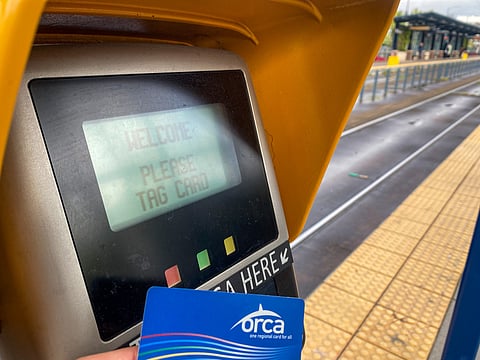Sound Transit Board Passes a More Lenient Policy Toward Non-Paying Riders
by Lizz Giordano
Sound Transit is bringing back fines for non-payment on its trains and buses this fall after the agency paused fare enforcement during the pandemic, but it has also instituted a more lenient and accommodating system for riders who don't pay their fare.
The move is part of a yearslong effort to reform the transit agency's fare-enforcement policy after data showed Black and low-income riders were more likely to be cited and punished for failing to pay.
The board passed the new policy Thursday afternoon, giving non-paying riders two warnings in a 12-month period, instead of one, before a fine is issued. And for the third and fourth instances of non-payment, the rider is fined $50 and $75, respectively. Passengers may also have the option of avoiding the fine by loading money onto a transit pass or signing up for a subsidized transit card if qualified.
Subsequent interactions over lack of payment can lead to a larger fine of $124 and a civil court infraction, similar to a parking ticket. Activists and some elected leaders advocated removing the courts entirely from the agency's fare-enforcement policy, keeping the entire process within the transit agency.
"If someone is found with no proof of fare on five separate occasions, we should be asking ourselves what we can do to financially assist this person's mobility, rather than sending them through a far more costly court system," said King County Councilmember Girmay Zahilay, who does not sit on the Sound Transit board but has been tracking the issue.
King County Councilmember Joe McDermott proposed eliminating the agency's ability to issue civil infractions.
"Infractions don't work," McDermott said during the board meeting. "Unresolved civil infractions get referred to collections, resulting in disproportionate financial, credit, employment, and more impacts for a fare of some $3.50."
Other King County councilmembers who also sit on the Sound Transit board supported McDermott's proposal, including Claudia Balducci and Dave Upthegrove, along with King County Executive Dow Constantine.
When King County Metro removed the courts from its fare-enforcement policy, the agency didn't see an associated increase in fare evasion, Balducci said during the board meeting.
Others on the board pushed back.
"It's not about the $3.50. It's about ensuring that riders have to pay for the system they are using, as we promised the voters when we passed Sound Transit," said Cassie Franklin, mayor of Everett and board member, who didn't support the proposal to not issue civil infractions. "At the end of the day, how are we going to hold them accountable to pay? And the court is the system we have in our society, as imperfect as it is."
Ultimately, in a 9-to-7 vote, the board opted to retain the agency's option of issuing a civil infraction. In a separate 13-to-3 vote, board members removed the agency's ability to send unpaid fines to collections, another McDermott proposal.
Seattle Mayor Bruce Harrell didn't support either proposal to separate Sound Transit fare-enforcement policy from the court system.
Sound Transit's light rail stations lack turnstiles; instead, the agency relies on a proof-of-payment system in which passengers are periodically checked by what are now known as "fare ambassadors." The position, which is supposed to take on more of a customer service role — helping passengers buy and use fare cards — replaced fare-enforcement officers whom some criticize as resembling law enforcement.
Metro overhauled its policy following a 2018 County audit that found nearly a quarter of fare-enforcement tickets went to people who were experiencing homelessness or housing instability, many of whom qualified for a subsidized fare program.
Sound Transit's new policy, which will take effect in September, also ends suspensions; allows riders found without payment to continue to ride; and will no longer direct fare-enforcement ambassadors to call the police over an unpaid fare, another shift sought by activists.
The agency says fare evasion is increasingly becoming an issue, estimating that in January of this year, 42% of riders didn't pay before boarding. Which, along with the decline in ridership due to the pandemic, is contributing to the agency's declining fare revenues.
Lizz Giordano is a freelance multimedia journalist based in Seattle's Rainier Valley focusing on transit and housing. She can be reached on Twitter @lizzgior, and more of her work can be found on her website.
Featured Image: After a yearslong process to reform its fare enforcement policy, the Sound Transit board approved a new system allowing for more warnings but reserved the right to involve the courts if someone is found without payment five or more times in a 12-month period. (Photo: Lizz Giordano)
Before you move on to the next story …
The South Seattle Emerald™ is brought to you by Rainmakers. Rainmakers give recurring gifts at any amount. With around 1,000 Rainmakers, the Emerald™ is truly community-driven local media. Help us keep BIPOC-led media free and accessible.
If just half of our readers signed up to give $6 a month, we wouldn't have to fundraise for the rest of the year. Small amounts make a difference.
We cannot do this work without you. Become a Rainmaker today!
Help keep BIPOC-led, community-powered journalism free — become a Rainmaker today.


